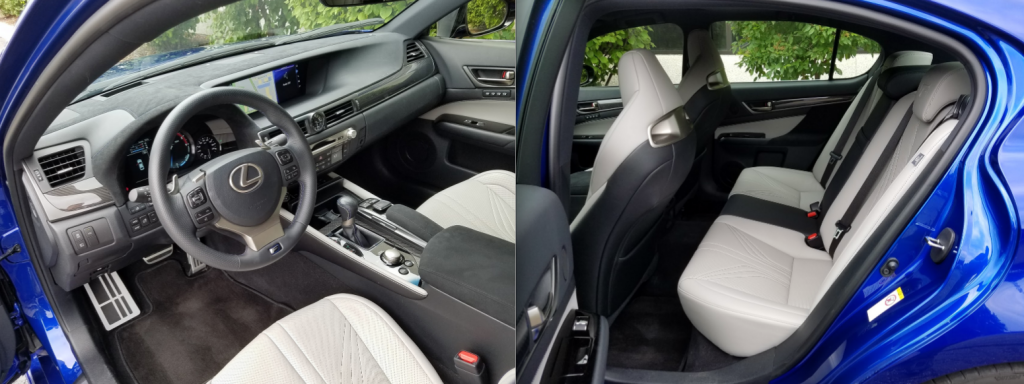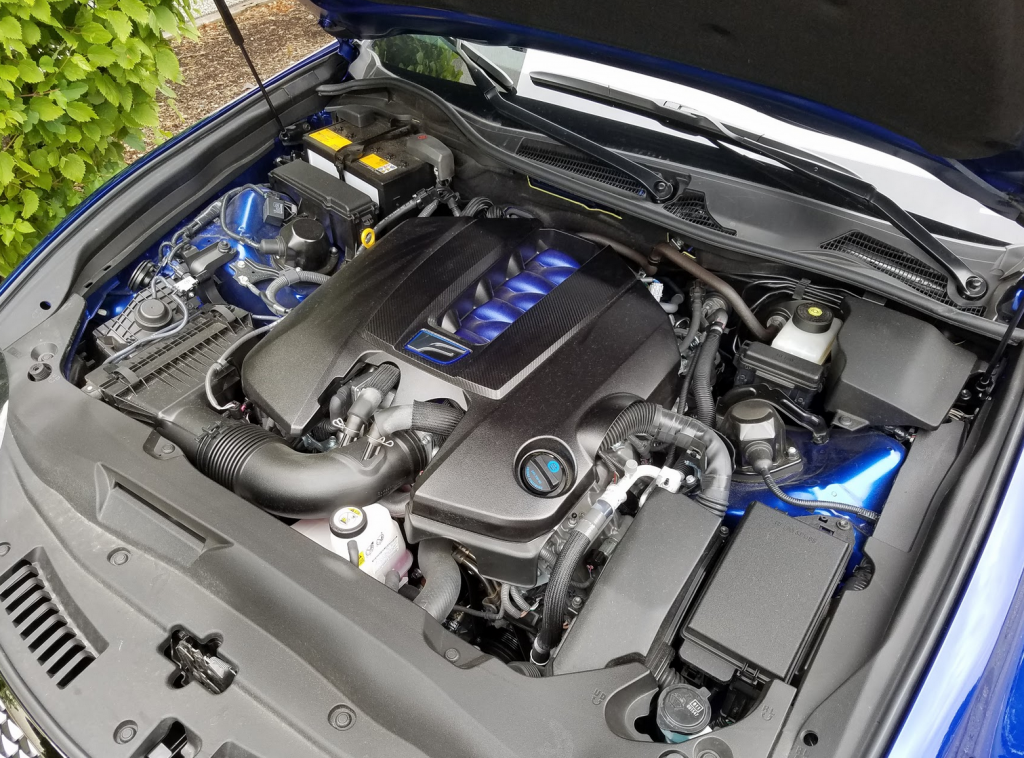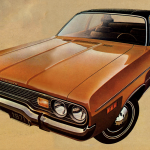
 2017 Lexus GS F
2017 Lexus GS F
Class: Premium Midsize Car
Miles driven: 459
Fuel used: 23.7 gallons
Real-world fuel economy: 19.4 mpg
Driving mix: 60% city, 40% highway
| CG Report Card | |
|---|---|
| Room and Comfort | B+ |
| Power and Performance | B+ |
| Fit and Finish | A- |
| Fuel Economy | C+ |
| Value | B- |
| Report-card grades are derived from a consensus of test-driver evaluations. All grades are versus other vehicles in the same class. Value grade is for specific trim level evaluated, and may not reflect Consumer Guide's impressions of the entire model lineup. | |
| Big & Tall Comfort | |
| Big Guy | B- |
| Tall Guy | B |
| Big & Tall comfort ratings are for front seats only. "Big" rating based on male tester weighing approximately 350 pounds, "Tall" rating based on 6'6"-tall male tester. | |
EPA-estimated fuel economy: 16/24/19 (city, highway, combined)
Base price: $83,940 (not including $975 destination charge)
Options on test vehicle: 19-inch alloy wheels ($600), Heads-Up Display ($900), orange-painted brake calipers ($300) special paint ($595)
Price as tested: $87,310
Quick Hits
The great: Blistering performance
The good: Refined cabin, assembly quality
The not so good: Rear-seat passenger space
More GS price and availability information
John Biel
The Lexus GS F sedan has a 467-horsepower V8, an enhanced suspension, and a plush and sporty interior, but still one of the more impressive things about it may be the trunk.
Even though the wheel houses do press in from the sides, the GS F still has ample space on a flat floor that extends far forward into the squared-off cargo hold. At 14 cubic feet it is not the biggest in the premium-midsize class but isn’t the smallest, and its shape holds the promise of being able to accommodate a variety of loads. Its utility is further enhanced with a covered bin for incidentals on the left side and a bit of shallow but wide space under the fully carpeted floor. The rear seats don’t fold but there is a big pass-through to accommodate long items.

Of course, while owners may find the GS F’s trunk useful from time to time, that’s not necessarily what attracted them to a sport sedan. Going, stopping, and handling are the prime draws for such a car. Those are all things this Lexus can do pretty well, too.
The F model was added to the GS line in 2016 with the 5.0-liter V8, 8-speed automatic transmission with paddle shifters, and Torque Vectoring Differential (TVD) from the RC F coupe. For 2017 it adds a faster-acting Adaptive Variable Suspension (AVS) to a complement of standard equipment that gives the GS F a starting price of $83,940.

The naturally aspirated V8 hits its power peaks a ways up the tachometer dial (467 horsepower at 7100 rpm; 389 lb-ft of torque at 4800), so while launches certainly are brisk, the GS F takes a moment to truly come into its own. Drivers can fine-tune that performance through the standard Drive Mode Select system activated by a console-mounted selector. A “Normal” mode balances the need for fuel economy with good engine performance; “ECO” moderates power output and climate settings for thriftier operation; “Sport” and “Sport S+” deliver quicker throttle response. S+ registers the quickest downshifts and Lexus says that it is engineered to downshift during hard braking for a corner, hold a lower gear through the corner for added control, and then provide a quicker corner exit by selecting a suitable gear. The virile exhaust note in Sport S+ lives up to the high-performance image thanks to an Active Sound Control feature that can counteract noises that interfere with the sound.

The engine can function in fuel-scrimping Atkinson-cycle operation. Even then, it is rated by the EPA at 16 mpg in the city, 24 on the highway, and 19 overall. However, when this reviewer drove Consumer Guide®’s test car for 159 miles in a mix of Normal and Sport, he record 21.6 mpg—and that with 60 percent of test miles in city-type driving.
Underpinning everything is an independent-front/multilink-rear suspension with stabilizer bars at both ends, 255/35R19-front and 275/35R19-rear tires on forged-alloy wheels, and Brembo ventilated disc brakes. The TVD distributes power between the rear wheels, almost behaving like rear-wheel steering at times. “Standard,” “Slalom,” and “Track” settings alter the degree to which this happens. AVS damping changes with the selected drive mode. It uses new “linear-solenoid” monotube shocks to control body motions when cornering while also influencing ride quality. (Lexus claims the system recalibrates damping force four times faster than previous AVS systems.) Furthermore, dialing up Sport S+ unmistakably tightens up steering response a bit. This driver’s normal commuting didn’t overtax the GS F’s handling ability, and ride was nicely composed for a sport sedan—even moving up to the Sport settings didn’t make it punishing. Braking was excellent.
In addition to the aforementioned mechanical performance features, the GS F comes with a goodly share of comfort, convenience, and safety equipment.
Distinct external items are a unique front fascia, vented front fenders, and a carbon-fiber decklid spoiler. Other key standards are heated power-folding external mirrors; LED headlamps; power moonroof; F-specific leather-wrapped steering wheel; Remote Touch controller for the 12-speaker audio system, Enform infotainment system with app suite, and navigation system; satellite radio; leather upholstery; heated and ventilated front seats; Alcantara door, dash, and central-armrest trim; aluminum pedal trim; dual-zone automatic climate control; and rain-sensing windshield wipers. Most safety technologies are bundled in the Lexus Safety System+: forward-collision detection, adaptable cruise control, automatic high-beam headlights, lane-departure alert, and lane-keeping assist.

Seats are contoured for good grip of passengers during hard and fast maneuvers. Indeed, the high-back front buckets have built-in headrests with a shape that makes the seat look like the throne of some sci-fi intergalactic warlord. Soft-touch surfaces are seemingly everywhere, even the sides of the console. The graphics—and information—on the large, legible driving controls change with the selected driving mode. The infotainment system uses a large 12.3-inch display screen in the dash, but manipulating what’s on it requires fiddling with the sometimes-distracting console-based Remote Touch.
Legroom is better in front than it is in the rear; the same can be said for headroom. A tall driveline hump precludes 3-across adult seating in back—even many kids would be hard put to sit comfortably in the center position. Doors open wide, but narrow bottoms in the rear doors restrict entry and exit a little. Interior storage comes down to a console cubby under the sliding center armrest (with device inputs and a power point within), twin covered cup holders, a sizeable glove box, and door map pockets up front. Rear occupants get small door pockets, pouches on the backs of the front seats, and a pull-down arm rest with a shallow covered storage box, a small open bin, and pop-out cup holders.
On base price, if not necessarily power, the GS F is competitive with the Cadillac CTS-V in a performance-sedan class that’s a little thin just now with the current absence of a BMW M5 or a Mercedes-Benz E-Class AMG 63. However, the Lexus does present a nice blend of muscle and comfort that executive sport sedan buyers may find intriguing.




